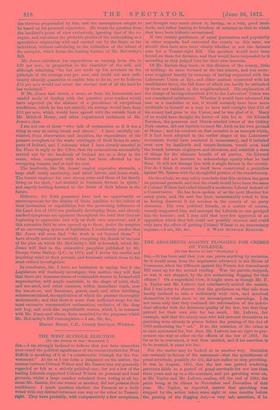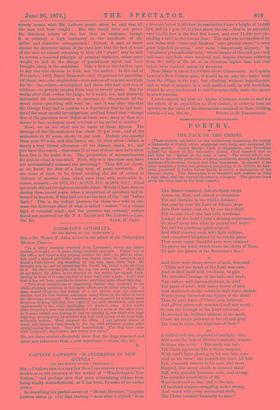THE ARGUMENTS AGAINST FLOGGING FOR CRTMES , OF VIOLENCE.
[To THE EDITOR OP THE "SPECTATOR."] SIR,—It has been said that you can prove anything by statistics.. So it would seem, from the arguments advanced in the House of Commons, when the Offences against the Person Act Amendment Bill came up for the second reading. Was the garotte stopped, or was it not stopped, by the Act authorising flogging for that offence ? On a superficial view, it might seem as though Mr. P. A. Taylor and Mr. Lefevre had conclusively settled the matter._ But I was sorry to observe that the gentlemen on that side were- hardly inclined to take a sufficiently wide view, and involved themselves in what seem to me inconsequent reasonings. I de not mean only that they confused the reformation of the indivit dual offender with the deterrent quality of the law, but that they proved for their own side far too much. Mr. Lefevre, for example, said that the ninety men who had devoted themselves to garotting were already in prison before the passing of the Act of 1863 authorising the " cat." If so, the cessation of the crime is. at once accounted for, but then Mr. Lefevre has no right to pro- nounce one way or other on the effects of the law of 1868. So far as he is concerned, it was then untried, and if his assertion is to be trusted, it came too late.
But the matter may be looked at in another way. Statistics are certainly in favour of the statement—that the punishment of penal servitude, possibly for life, did not suffice to stop garotting. It was in August, -1861, that the law was passed rendering garotters liable to a period of penal servitude for not less than three years and up to a life-sentence, and yet garotting went on, as Mr. Taylor and Mr. Lefevre confess, till the end of 1862, the panic being at its climax in November and December of that year. Mr. Taylor, as reported, asserts that garotting was stopped by the action taken some eight or nine months before the passing of the flogging Act,—a very safe assertion, if he
merely means what Mr. Lefevre meant when he said that all the men had been caught ! But this surely does not prove the deterrent nature of the law then in existence, though it is certainly a high testimony to the excellence of the police and detective arrangements ! Indeed, it says so much .against the deterrent nature of the then law, that the fact of none of the men on release returning to their old " plant " may be said to reverse a received principle of criminal statistics, unless some weight be laid on the change of punishment which had been brought about in the meantime. Take a fact or two further open to any one who chooses to look into the matter. In the end of November, 1862, Baron Bramwell tried 19 persons for garotting. Of these, two—the ringleaders—were sentenced to penal servitude for life ; the others—accomplices and those who had used less of violence—to periods ranging from four to twenty years. But for weeks after that—when the judge, be it noted, too, had distinctly intimated his determination to sentence to life-periods all the worst cases—garotting still went on ; and it was after this that Sir George Grey had to confess to a deputation that he had insti- tuted the most careful investigations, and had found that " though few of the garotters were ticket-of-leave men, many of them were known to have undergone penal servitude at one period or another."
Now, let us see what can be made of these figures. The average of the life-sentences was about 10 per cent., and of the sentences to 20 years about 15 per cent. Deduct one-quarter from your 90 men, and that leaves, say, 65, then allow—which is surely a very liberal allowance--80 for disease, death, &c., and you have this result,—that some 25 at least of these men have since been free in the midst of us. The proportion of recommitments for serious crime is one-third. Now, why is it that these men have not systematically resumed the garotting? They did not desist, as we know, for fear of a long term of penal servitude. Or are some of them to be found swelling the list of crimes of violence of another class, which runs thus, with noticeable in- crease, recently,—in 1872, 311; in 1873, 312; in 1874, 351 ? Penal servitude did not for eighteen months deter. Would it have done so during these recent years, when a proportion of garotters had re- turned to freedom, if they had not had the fear of the " cat" before them ? This is the radical question for those who wish to esti- mate the deterrent effect of what is called " torture " on a certain type of criminal mind ; and the question was certainly neither faced nor answered by Mr. P. A. Taylor and Mr. Lefevre.—I am,



































 Previous page
Previous page